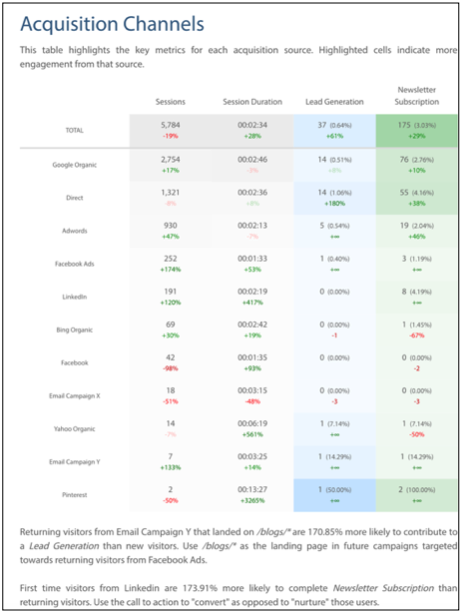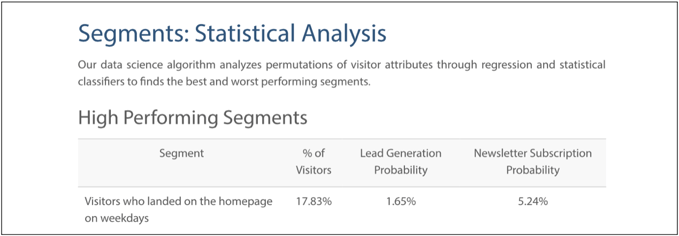This post is part of our Spotlight series featuring AI-powered companies and products that marketers can use to drive performance and transform their careers.
 Marketers glean insights from data and analytics day in and day out. It often requires correctly setup conversion tracking in analytics platforms and heavy reading in terms of data analysis. But at the end of the day, we're answering the baseline web analytics questions, "What insights does the data show? And is what we're doing working?"
Marketers glean insights from data and analytics day in and day out. It often requires correctly setup conversion tracking in analytics platforms and heavy reading in terms of data analysis. But at the end of the day, we're answering the baseline web analytics questions, "What insights does the data show? And is what we're doing working?"
PaveAI (@paveAI) is an AI platform that uses machine learning with Google Analytics to answer those questions for us. Its machine learning algorithms comb through more than 16 million possible combinations to produce data-driven reports with predictive metrics, predictive analytics, and actionable insights that help Google Analytics users achieve their marketing goals.
It's a level of smarter marketing that just isn't possible with traditional analytics.
We learned how by talking to Eric Ho, founder of PaveAI, about this AI in analytics solution.
In a single sentence or statement, describe PaveAI.
PaveAI uses machine learning and data science to turn Google Analytics data into actionable recommendations and reports.

How does the company use artificial intelligence (i.e. machine learning, natural language generation, natural language processing, deep learning, etc.)?
PaveAI uses machine learning and data science algorithms to implement statistical models. Along with context-based knowledge, this allows us predict the value of each segment of users that visit a website. We then use natural language generation (NLG) to make these insights digestible to our businesses and customers.
What do you see as the limitations of artificial intelligence as it exists today?
There are philosophical debates around the creative and artistic limitations of AI. If a computer creates a piece of music, is it being “creative” or just repeating what it's learned? But from a more practical perspective, the limitations largely revolve around data and dealing with true randomness.
AI algorithms often require copious amounts of relevant data to be able to “learn.” Google’s self-driving cars are working off of petabytes of data (for scale, one petabyte takes 20 years to download at average internet speeds). While PaveAI isn’t building self-driving cars, our algorithm has to learn from hundreds of millions of data points to be able to consistently identify key insights.
The other big limitation is the interaction of AI with randomness. Every human being is different, and our behavior is hard to predict. Self-driving cars could be deployed all over the roads tomorrow if AIs were driving every car, but because they currently have to drive alongside humans, the problem becomes significantly more difficult.
In the long term, we believe that, given enough data and appropriate context, AI can perform almost any task better than a human.
What do you see as the future potential of artificial intelligence in marketing?
We’ve already seen AI customize messaging, tailor websites for each user, and optimize drip campaigns. One of our customers even uses AI to do automatic store pricing.
As AI around fitness and medicine advances, we will see marketing target people depending on the exercise they do, the frequency they do it, and their fitness goals. Based on behavioral clues, algorithms would predict when a person is just about to make a purchase and automatically execute a direct marketing campaigns to target them.
What makes PaveAI different than competing or traditional solutions?
We actually turn data into recommendations! While other companies just show you graphs and tell you how much your bounce rate increased in sentence format, we can tell you the relationship between different data points, whether they are relevant, whether it’s a causation vs. correlation, and suggest ways for you to achieve your goals.
Different data sets produce different results—and unlike other solutions, we built our algorithm with marketing and the understanding of how each website is different in mind. In other words, we’re not a generic one-size-fits-all solution that was repurposed.
This starts with good data. We first post-process the data, meticulously cleaning and removing spam hits. We then integrate different data sources, like Facebook ads and AdWords, ensuring that they are consistent and allowing us to connect cost to the exact behavior a user does before buying.
Our algorithm then looks at over 16 million possible permutations, figures out the factors that affect conversions the most, and tell you exactly how to improve factors that you can control.
The result is a beautiful and usable report that tells users everything they need to know about their website and the marketing efforts conducted, from inbound to outbound, organic to ads.

Who are the prototype customers in terms of company size and industries?
We process over 300 million visitors a month, and have customers like Four Seasons Private Residences, Highrise by Basecamp, Ways We Work, and hundreds of agencies and industries.
What are the primary use cases of PaveAI?
If you don’t have hours to spend digging through analytics, finding insights and figuring out what’s working, what’s not and how to improve, PaveAI tells you exactly how to increase your ROI.
For example, we can predict how many more leads you would get if you reallocate $200 from “Facebook Campaign A” to “Inbound + Adwords Campaign C”.
Our partner program allows agencies to use these reports for their clients. Agencies can tell the software which marketing effort to comment on, plus have the ability to edit and white-label the reports. We’ve seen an increase in client retention of over 212%.
Any other thoughts on AI in marketing, or advice for marketers who are just starting to explore the possibilities of AI?
The Singularity Is Near by Ray Kurzwell, while not an AI book targeted toward marketers, is a fantastic book about the future of AI and its ramifications. Our investors, Y Combinator, also partnered with Elon Musk to start OpenAI, which had a fascinating interview titled How to Build the Future on YouTube.
But most of all, experiment! Try and see what tools work for you, and understand its limitations. While AI is great at helping marketers augment their workflow, other aspects, like the human and creativity aspect, have yet to hit their boundaries.
Paul Roetzer
Paul Roetzer is founder and CEO of Marketing AI Institute. He is the author of Marketing Artificial Intelligence (Matt Holt Books, 2022) The Marketing Performance Blueprint (Wiley, 2014) and The Marketing Agency Blueprint (Wiley, 2012); and creator of the Marketing AI Conference (MAICON).




